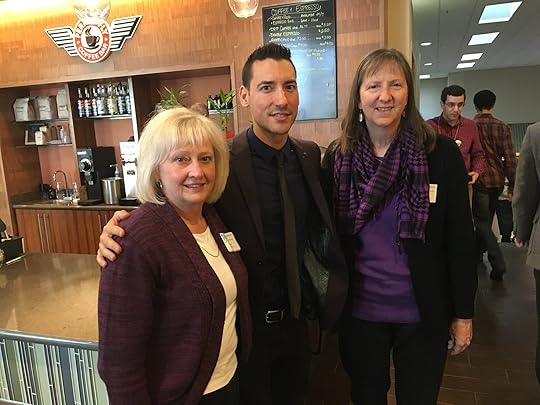Randy Alcorn's Blog, page 149
May 18, 2016
An Update on David Daleiden and the Center for Medical Progress Videos
Readers of my blog are likely familiar with the controversy surrounding the undercover videos from The Center for Medical Progress, which I posted about last year. I hope you’ll read today’s blog to get an update on David, who led the investigation, and consider how you can help by continuing to share the truth about Planned Parenthood and the evils of abortion. —Randy
 “What an amazing young man!” That was the response from Karen, one of our EPM staff members, after hearing David Daleiden speak at the recent Oregon Right to Life annual conference. Three of our staff attended the weekend conference (that's Sharon and Karen in the picture with David), which featured speakers Ann McElhinne, one of the producers of the documentary “Gosnell: America’s Biggest Serial Killer”, and David, who is the founder of The Center for Medical Progress. The 27-year-old headed up the undercover team that investigated Planned Parenthood’s selling of fetal tissue. (You can watch David’s full session, available from Oregon Right to Life.)
“What an amazing young man!” That was the response from Karen, one of our EPM staff members, after hearing David Daleiden speak at the recent Oregon Right to Life annual conference. Three of our staff attended the weekend conference (that's Sharon and Karen in the picture with David), which featured speakers Ann McElhinne, one of the producers of the documentary “Gosnell: America’s Biggest Serial Killer”, and David, who is the founder of The Center for Medical Progress. The 27-year-old headed up the undercover team that investigated Planned Parenthood’s selling of fetal tissue. (You can watch David’s full session, available from Oregon Right to Life.)
In January, a grand jury cleared Planned Parenthood of wrongdoing and indicted David for violating the state's “prohibition of the purchase and sale of human organs.” (David turned down a plea deal, and posted bail in March. His legal team has filed a motion to have the charges dismissed.)
When he was asked at the conference how we can pray for him, David requested prayer for courage, wisdom, and clarity. Let’s be sure to pray the Lord would continue to use his efforts to expose the evils of the abortion industry, especially because of the continued and successful efforts by Planned Parenthood and the media to cover over and dismiss the videos as “highly edited” and “false.” This is a complete fabrication, especially since the entire unedited videos are available for all to see. As David said at the conference, “Cameras don’t lie.”
Jeremiah’s words seem prophetic of our own time: “Everyone deceives his neighbor, and no one speaks the truth; they have taught their tongue to speak lies; they weary themselves committing iniquity” (Jeremiah 9:5). Speaking of the Antichrist and people’s rejection of Christ, Scripture describes those who refuse “to love the truth” (2 Thessalonians 2:10). A refusal to love the truth aptly describes those who refuse to look at the truth about abortion.
If you’d like to help support efforts to defend David legally, you can give to the Life Legal Defense Foundation .
May 16, 2016
One Mom’s Journey into Foster Care

One of the most prolife actions we can take is to open our homes and lives to others in need. Every time you see Christ-loving people who are proactive about caring for the fatherless, it conveys the value of human life and the importance of meeting the needs of the truly needy. Scripture emphasizes helping widows and orphans, and foster care (and adoption) is all about opening your home to the neediest of those. James 1:27 says, “Religion that God our Father accepts as pure and faultless is this: to look after orphans and widows in their distress…”
May is National Foster Care Month, a great time to bring awareness to the need for stable, Christ-loving families to reach out to the countless needy children in our nation’s foster care system. Is God encouraging you and your family to consider opening your home?
True, not every family is called to provide foster care or adopt. But should the people of God as a whole be challenged to get involved and support other people in the body of Christ who are? Absolutely!
Today’s blog features an article from Jamie C. Jamie and her husband have two biological children, and also provide a safe and loving home for the foster children God has brought into their lives. You can find Jamie’s blog at Foster the Family. I think you’ll appreciate what our sister has to share. —Randy Alcorn
 I have not given one back yet. At least not one that I have had for more than a few days, one that I have fallen in love with. Friends tell me you cry the day you find out they are leaving, and you cry the day they leave. Then you start all over again, fall in love again, say goodbye again. Sometimes I wonder if I will be able to do it, give them back, but of course I will, whether or not I think I can. This is what I signed up for. This is foster care.
I have not given one back yet. At least not one that I have had for more than a few days, one that I have fallen in love with. Friends tell me you cry the day you find out they are leaving, and you cry the day they leave. Then you start all over again, fall in love again, say goodbye again. Sometimes I wonder if I will be able to do it, give them back, but of course I will, whether or not I think I can. This is what I signed up for. This is foster care.
I cannot remember what exactly brought foster care to the forefront of my mind, but in a mind like mine, when something comes to the front, it gets stuck there. So I read about it, talked about it, prayed about it, and I became compelled to do something.
I was compelled by the stories of children, just like mine, living right across town from me who were hurt, starved, raped, ignored. I was compelled by the statistics that predict these kids’ futures: jail, pregnancy, homelessness, further abuse. I was compelled by admitting what is true: God created them, loves them, values them, and died for them, just like He did for me and my own children. Ultimately, I was compelled by the most compelling thing: the fact that I, too, was rescued. These kids were just like me: helpless, hopeless, fatherless.
So, that was it. I had to do something. But my husband and I are a team; we do “somethings” together. And so began the months of talking, praying, and struggling through what this something was. We know God loves orphans, we know God wants us to love orphans, but does that mean we have to upend our happy “one-boy one-girl, all we ever wanted” family to love them?
The discussions were heavy as we struggled through the questions. What were we “called” to? What did we want? What could we handle? So we simplified the discussion. Instead of talking about it as if it were a life calling, we talked about it as if it were an opportunity to serve. Maybe we could serve this way for a year, maybe for the rest of our lives. The question changed from a question of personal desire and calling to a question of faith. Did we have faith for each individual step in the process? My answer came immediately; his took a little longer. But the answer came. Yes, we did have faith to hand in our application. Yes, we did have faith to take the training classes. Yes, we did have faith to go through the home study process and yes, we did have the faith to say, “Call us when there’s a kid who needs a home.”
We got the call. I never saw her in her home with her “real” mom, but the quick story from the social worker engrained a permanent picture in my head: she sits in a play pen because the rest of the house is covered in hundreds of soiled diapers, maggots, third-world type filth. Old enough to walk, but she can barely crawl. Old enough to talk, but she cries without a sound. Old enough to eat and feed herself, but she chokes on anything but the bottle of milk stuck in her mouth to stifle her whining. Old enough to understand, but she is ignored by her mom, taken by a stranger, and brought to live with me.
I shook with nervous excitement as I opened the door to this little stranger who would now be my maybe-temporary, maybe-forever daughter. She sat in the middle of my living room, looking too scared to even move. She stared at us with tear-filled eyes and a tight-lipped “I’m trying to be brave” smile, too frightened to even cry. Like God wired her to do, she immediately identified me as “mom” and clung to me like her life depended on it, like some stranger would come and take her away from me, too. My head and back hurt every night from the burden of carrying her weight and the tension of trying to “figure out” this child I didn’t even know.
But that was in August. It is not like that anymore. Now she is just one of my kids. I change her diapers and feed her, kiss her and cuddle her, worry about her and pray for her, get impatient with her and sin against her. Functionally, she is my daughter in every sense of the word. Biologically? Legally? She’s not my daughter at all. Chances are one day the same worker who brought this broken little girl to my home will pick her up, just a little more whole, and take her away from me forever. It will be the single greatest sacrifice of my life.
 But, oh, my God knows about giving up a child. My God knows about sacrificial love, and so it is His sacrificial love that ultimately compels me. I cannot save any child who comes into my home. I am no savior. But I have been rescued by the Savior, transformed by the Savior, and I am now compelled to live like the Savior.
But, oh, my God knows about giving up a child. My God knows about sacrificial love, and so it is His sacrificial love that ultimately compels me. I cannot save any child who comes into my home. I am no savior. But I have been rescued by the Savior, transformed by the Savior, and I am now compelled to live like the Savior.
So I care for the two baby girls who have entered our lives in need of a temporary home, a temporary mom. I meet their physical needs, always remembering their greater need, their spiritual need. I love them, I tell them Jesus loves them, I sing them songs of the gospel, and I pray for them. I pray for their little bodies, their hearts, and their futures. But my prayers do not stop there. I pray that their moms and dads will change in the only way they can actually change, by coming to know the rescuing, transforming love of Jesus themselves. And I pray for my own heart, that I will love these kids like my own while they are in my house. That I will be able to give them back when it comes to that, and that I will always have a heart to love and rescue children like my Savior has loved and rescued me.
From Eternal Perspective Ministries
You might also like to read Jamie’s post on practical ways to support foster families, as well as her post with answers to common questions for those considering fostering.
Another recommended resource is Levi Shepherd’s book Millennial Orphan, which tells his story of heartache and loss (including growing up in different foster homes), poor choices and hopelessness, as well as the amazing love and redemption of Jesus.
Photo credit: Jon Ottosson via Unsplash | Photo credit for Jamie's pictures: Hannah Marie Photography
May 13, 2016
A Message for High Schoolers and Everyone Else Too: Find Your Happiness in Christ

Last year I had the privilege of talking to a group of high schoolers about happiness. I love young people and enjoy spending time with them, so it was a pleasure to bring them a message I feel is of utmost importance for people of all ages.
When I was 15 years old, I came to faith in Christ. I discovered that a lot of my unhappiness had been due to my sin and separation from God, and that when I came into a relationship with Jesus, my life was infused with a happiness I’d never felt before.
Now, have I been happy every moment since then? Of course not. In Scripture, Paul talks about the fact that we’re sorrowful, yet always rejoicing (2 Corinthians 6:10). What we always have to rejoice in—what does not change—is the love of God for us. Romans 8 says that Jesus gave His life for us, and is going to transform the world itself and not only us, but all who have faith in Him. It says that we’re more than conquerors through Him who loved us. It says nothing shall separate us from the love of Christ, and that God loves us and causes all things to work together for good for those who know and love Christ and are called according His purpose.
My challenge to the students was this: Satan, your sin nature, and the world are going to try to convince you that you can’t find happiness in Christ. We need to counteract that with the understanding that God Himself is the primary source of all happiness in the universe. When we try to find happiness outside of God, the closest we can get is just a small taste of it.
Here's the video of my message. You can also read the full transcript.
photo credit: Nick Miller via Unsplash
May 11, 2016
Where’s Your Heart?

Christ’s words were direct and profound: “Where your treasure is, there your heart will be also” (Matthew6:21). By telling us that our hearts follow our treasure, Jesus is saying, “Show me your checkbook, your VISA statement, and your receipts, and I’ll show you where your heart is.”
Suppose you buy shares of General Motors. What happens? You suddenly develop interest in GM. You check the financial pages. You see a magazine article about GM and read every word, even though a month ago you would have passed right over it.
Suppose you’re giving to help African children with AIDS. When you see an article on the subject, you’re hooked. If you’re sending money to plant churches in India and an earthquake hits India, you watch the news and fervently pray.
I’ve heard people say, “I want more of a heart for missions.” I always respond, “Jesus tells you exactly how to get it. Put your money in missions—and in your church and the poor—and your heart will follow.”
Do you wish you cared more about eternal things? Then reallocate some of your money, maybe most of your money, from temporal things to eternal things. Put your resources, your assets, your money and possessions, your time and talents and energies into the things of God. Watch what happens. As surely as the compass needle follows north, your heart will follow your treasure. Money leads; hearts follow.
God wants your heart. He isn’t looking just for “donors” for His kingdom, those who stand outside the cause and dispassionately consider acts of philanthropy. He’s looking for disciples immersed in the causes they give to. He wants people so filled with a vision for eternity that they wouldn’t dream of not investing their money, time, and prayers where they will matter most.
Of course, giving isn’t the only good thing we can do with money. We need to feed, clothe, house, and transport our families. But when the basics are taken care of, why shouldn’t the rest go toward treasures in heaven?
Moses left Egypt’s treasures “because he was looking ahead to his reward” (Hebrews 11:26).
He who lays up treasures on earth spends his life backing away from his treasures. To him, death is loss.
He who lays up treasures in heaven looks forward to eternity; he’s moving daily toward his treasures. To him, death is gain.
He who spends his life moving away from his treasures has reason to despair. He who spends his life moving toward his treasures has reason to rejoice.
Are you despairing or rejoicing?
Photo credit: Fabian Blank via Unsplash
From Eternal Perspective Ministries
What we do with money has an eternal impact. Randy Alcorn has written extensively and biblically on the subject of giving and money. Now you can take an additional 20% off our discounted prices on Randy's money books by using the code MONEYBOOKS at checkout. Promo includes The Treasure Principle; The Treasure Principle Bible Study; The Law of Rewards; Managing God's Money; and Money, Possessions and Eternity. Code expires on Tuesday, May 17 at 4 P.M. PT.
May 9, 2016
Kids—and Adults—Need to Get Outside

Several years ago, a friend and I were driving through a neighborhood on a beautiful summer day and he said, “We haven’t seen a single kid outdoors. They’re all inside, watching movies, playing video games and looking at computer screens.”
Nanci and I have talked about how when we were growing up, free time when it was daylight meant being outside, and free time at night meant reading a book. I have great memories of playing army in the wheat fields around our house, and playing football and basketball at the local grade school, then getting in bed early and reading sometimes for hours before turning out the light.
Our daughters, Karina and Angela, are both raising boys. Nanci and I are proud of them and their husbands, and the way they are carefully training their sons. Part of that is limiting the amount of screen time they get each day, and encouraging them to go outside and enjoy God’s creation, and read books as well!
As an adult, I still love to be outside. I especially love going out on my favorite bike trail, the Springwater Corridor, and breathing the fresh Oregon air, watching for rabbits and other wildlife and thoroughly enjoying the Creator's art work.
Studies show there is a high correlation between indoor living and depression. As a counselor years ago, I noticed that the time of year when people suffer most from depression (and just about every other emotional disorder) is in the months of November through February. In fall and spring the requests for counseling were half of what they were in winter, and in the summer they were even fewer. (Certainly there are other factors that contribute to this, but lack of regular exposure to sunlight and fresh air in the winter months is a major one.)
This is a thought-provoking video, one that’s not Christian or Bible-based but is nonetheless very revealing, about how kids’ ideas about having fun have radically changed over the years.
One of my favorite things in the world is going on bike rides and throwing a football with my grandsons. Make time outdoors part of your daily plan for both yourself and your family. Whether it’s working in the garden, an outdoor quiet time, or a daily walk or run or bike ride, get out and do something—for God’s glory and for the good of your children and grandchildren!
Photo credit: Miles Tan via Unsplash
May 6, 2016
EPM Resources to Share with Your Spanish-Speaking Friends

That God will redeem people of every tribe and language (Revelation 5:9) suggests that He has special interest in the work of Bible translation, the broad international reach of the JESUS film, and all mission endeavors (including those for unreached people groups). I believe the diversity of languages provides a wider range of opportunity to glorify God: “We hear them declaring the wonders of God in our own tongues!” (Acts 2:11).
Currently, our ministry is focusing on offering more resources in Spanish, which is now the second most-spoken language in the world (after Mandarin Chinese). Several of my books are available in Spanish and some we sell through EPM’s store, including my graphic novel Eternity (Eternidad), Heaven (El Cielo), and The Purity Principle (El Principio de la Pureza).
 One fun connection in the Spanish-speaking world happened when Eternal Perspective Ministries staffer Doreen Button and her husband Mike visited Barcelona, Spain during their trip to Europe in March. The Buttons got to meet Dorcas and Marcos, who had emailed EPM about their evangelical church’s Heaven-related teaching and outreach. Marcos had written us, “It's great when we have evidence that we are part of the universal body of Christ! Please, if you even come to Spain, do visit us!”, and the Buttons had wonderful time doing just that, as well as bringing them some more of my books, including Happiness (which is being released in Spanish this November).
One fun connection in the Spanish-speaking world happened when Eternal Perspective Ministries staffer Doreen Button and her husband Mike visited Barcelona, Spain during their trip to Europe in March. The Buttons got to meet Dorcas and Marcos, who had emailed EPM about their evangelical church’s Heaven-related teaching and outreach. Marcos had written us, “It's great when we have evidence that we are part of the universal body of Christ! Please, if you even come to Spain, do visit us!”, and the Buttons had wonderful time doing just that, as well as bringing them some more of my books, including Happiness (which is being released in Spanish this November).
Over the years, we’ve heard some great things about churches utilizing the Spanish translations of my Heaven-related books. One Spanish-speaking pastor wrote this about my book Heaven (El Cielo):
El entusiasmo que ha levantado en mi iglesia el estudio de este libro es impresionante. La gente quiere saber más e invitar a sus familiares y amistades a escuchar estas verdades.
The enthusiasm that has been raised in my church because of the study of this book is impressive. People want to know more and to invite their relatives and friends to listen to these truths.
Pastor, Daniel Palaú Chávez, Iglesia Evangélica Metropolitana Emanuel
We also have over 60 free article resources in Spanish available, which I’m really excited about. Numbers of them are excerpts from my books in Spanish. I would love for individuals and ministries and churches to utilize these and share them with Spanish-speakers.
Available resources include:
¿Puedes Saber Que Irás al cielo? Extracto del Cielo (Can You Know You’re Going to Heaven?, Excerpt from Heaven)
¿Cómo Puede Ser Cielo si la Gente Está Consciente de lo Malo que Sucede en la Tierra? (If People in Heaven Are Aware of Bad Things Happening on Earth, How Could It Really Be Heaven?)
Con una mente celestial y útiles en la Tierra, Extracto de 50 Días del Cielo (Heavenly Minded and of Earthly Good, excerpt from 50 Days of Heaven)
¿Puede Dios perdonar el aborto? Extracto de ¿Por qué ser pro-vida? (Will God Forgive Abortions?, excerpt from Why ProLife?)
Also, we have posted 26 videos in Spanish on our website.
May God use these resources to impact lives for His kingdom! (Acceso Directo is another resource, with translated articles from writers like Ed Welch, John Piper, Albert Mohler, R.C. Sproul, Paul Tripp, and others.)
Writing about how God is working in Latin America, Jairo Namnún, editorial director for The Gospel Coalition’s Spanish website Coalición por el Evangelio, says this:
Because of dissatisfaction with superficial Christianity, there is an amazing hunger for the Word of God throughout Latin America. True believers are devouring anything that will help them handle the Word of Truth. More and more we hear of churches turning to sound doctrine for the first time. In a recent conference, I saw more than a hundred pastors from different countries step forward and repent of ministries that did not honor God.
Surely there’s still much work to be done, but the Lord is already at work in this moment. I too believe we’re experiencing the beginning of a revival. It is my prayer that believers in the Spanish-speaking world would be faithful to the Lord, diligent in the Scriptures, and prepared to give an answer to any and all who question the reason for our hope. If you believe you are being called, consider going, training, planting, or serving. In any case, will you join us in prayer?
What a privilege to offer resources in Spanish, and perhaps be a small part of the great work God is doing in Latin America and in the hearts of Spanish-speaking people around the world!
May 4, 2016
Phillip Holmes on the Heart of Socialism

The advantages and dangers of socialism is a hotly debated topic in today’s culture. There’s much that could be said about both capitalism and socialism, but of special interest to believers is how both systems help or hurt the poor.
Unfortunately, those who laud socialism ignore the fact that historically the poor usually fare better in capitalist economies. They also fail to recognize that when the profit incentive is removed from labor, someone must find another way to motivate people to work. There’s only one other way that works—coercion. The capitalist says, “You scratch my back and I’ll scratch yours.” Socialism ends up saying, in effect, “You scratch my back or I’ll break yours.”
Can capitalism sometimes involve exploiting the poor? Of course. Does socialism lead to the oppression of the poor? Inevitably. The point isn’t that capitalism is a perfect system, but that the alternatives are worse. It isn’t a systemic problem, it’s a sin problem. Any economic system will work where there’s no sin. None will work ideally when there is sin, but some will work better than others.
Phillip Holmes recently wrote a perceptive article for Desiring God addressing the heart of socialism.
Socialism is trending in the minds of many Americans. Some love it, some hate it, and others are indifferent to it. Some Christians argue that it’s evil, while others argue that it’s morally good or neutral. Those that argue for its wickedness often fail to condemn the crony capitalism and corporate welfare that is widespread in the United States; therefore, their arguments often fall on deaf ears with socialist sympathizers. The arguments for its moral good or neutrality typically appeals to emotion, rather than evidence, which is considered insufficient for those that oppose it.
The face that comes to mind when we think of socialism in this election cycle is that of Bernie Sanders—the self-proclaimed democratic socialist. But the reality is that forms of socialism have been a part of the fabric of America since the public school system (late 1800s) and FDR’s New Deal (1933–1938). Martin Luther King rightfully critiques the state of the country during his life when he said, “This country has socialism for the rich, rugged individualism for the poor.”
Furthermore, socialism is extremely difficult to pin down and most will agree that there are varying degrees of socialism. You’d be hard pressed to find a consensus on the Internet of what components embody a socialist government. But for my purposes here, I will use the definition provided by John Piper:
A social and economic system that through legal or governmental or military coercion—in other words, you go to jail if you don’t do this—establishes social ownership at the expense of private or personal ownership and/or you could say where coercion is used to establish social control—if not ownership, at least control of the means of production in society. And thus, through control, you effectively eliminate many of the implications and motivations of private ownership.
In other words, Socialism borrows the compassionate aims of Christianity in meeting people’s needs while rejecting the Christian expectation that this compassion not be coerced or forced. Socialism, therefore, gets its attractiveness at certain points in history where people are drawn to the entitlements that Socialism brings, and where people are ignorant or forgetful of the coercion and the force required to implement it — and whether or not that coercion might, in fact, backfire and result in greater poverty or drab uniformity or, worse, the abuse of the coercion as we saw in the murderous states like USSR and Cambodia.
Few question whether those who advocate for socialistic forms of government have good intentions. They clearly seem to care about the poor. Some, like Senator Sanders, want to fight much of the corruption that is currently in Washington. But as the saying goes, “The road to hell is paved with good intentions” (though, no, I’m not here condemning anyone to hell). In other words, the good intentions of “social programs” (a term I will continue to use below) will have unexpected bad consequences in the long run.
Photo credit: Gabby Orcutt via Unsplash
May 2, 2016
If “No Eye Has Seen,” How Can We Know About Heaven?

Years ago when I was working on my book Heaven, a pastor visiting my office asked what I was writing. When I told him, he replied, “Well, since Scripture says ‘No eye has seen, no ear has heard, no mind has conceived what God has prepared for those who love him,’ what will you be talking about? Obviously, we can’t know what God has prepared for us in Heaven.” (He was referring to 1 Corinthians 2:9.)
I said to him what I always say: “You didn’t complete the sentence. You also have to read verse ten.” Here’s how the complete sentence reads: “‘No eye has seen, no ear has heard, no mind has conceived what God has prepared for those who love him’—but God has revealed it to us by his Spirit” (emphasis added). The context makes it clear that this revelation is God’s Word (v. 13), which tells us what God has prepared for us. After reading a few dozen books about Heaven, I came to instinctively cringe whenever I saw 1 Corinthians 2:9. It’s a wonderful verse; it’s just that it’s nearly always misused. It says precisely the opposite of what it’s cited to prove!
What we otherwise could not have known about Heaven, because we’re unable to see it, God says He has revealed to us through His Spirit. This means that God has explained to us what Heaven is like. Not exhaustively, but accurately. God tells us about Heaven in His Word, not so we can shrug our shoulders and remain ignorant, but because He wants us to understand and anticipate what awaits us.
Another problem with using 1 Corinthians 2:9 is that it isn’t talking about Heaven. In its context, it refers to the salvation-related hidden wisdom of God. Some would argue that God’s hidden wisdom broadly includes wisdom about Heaven, but my point is that even if the verse did refer to Heaven, it says the opposite of what it is typically cited to prove, because verse 10 indicates that God has revealed these hidden truths.
Other verses are likewise pulled out to derail discussions about Heaven. For example, “The secret things belong to the Lord our God” (Deuteronomy 29:29). Heaven is regarded as a “secret thing.” But the rest of the verse—again, rarely quoted—completes the thought: “But the things revealed belong to us and to our children forever.”
We should accept that many things about Heaven are secret and that God has countless surprises in store for us. But as for the things God has revealed to us about Heaven, these things belong to us and to our children. It’s critically important that we study and understand them. That is precisely why God revealed them to us!
Another “silencer” is 2 Corinthians 12:2-4. Paul says that fourteen years earlier he was “caught up to paradise,” where he “heard inexpressible things, things that man is not permitted to tell.” Some people use this verse to say we should not discuss what Heaven will be like. But all it says is that God didn’t permit Paul to talk about his visit to Heaven. In contrast, God commanded the apostle John to talk about his prolonged visit to Heaven, which he did in detail in the book of Revelation. Likewise, Isaiah and Ezekiel wrote about what they saw in Heaven.
Although it’s inappropriate for us to speculate on what Paul might have seen in Heaven, it’s certainly appropriate to discuss what John saw, because God chose to reveal it to us. If He didn’t intend for us to understand it, why would He bother telling us about it? (When was the last time you wrote someone a letter using words you didn’t expect them to comprehend?) So, we should study, teach, and discuss God’s revelation about Heaven given to us in His Word.
Certainly, not everything the Bible says about Heaven is easily envisioned. Consider Ezekiel’s description of the living creatures and their wheels, and the manifestation of God’s glory that leaves the prophet groping for words (Ezekiel 1:4-28). Still, many other passages concerning Heaven are much easier to grasp.
Isaiah 55:9 is another verse often cited in support of a “don’t ask, don’t tell” approach to Heaven: “As the heavens are higher than the earth, so are my ways higher than your ways and my thoughts than your thoughts.” God’s thoughts are indeed higher than ours, but when He reduces His thoughts into words and reveals them in Scripture, He expects us to study them, meditate on them, and understand them—again, not exhaustively, but accurately.
Photo credit: Samuel Zeller via Unsplash
April 29, 2016
Christ-Centered Generosity Isn’t Just for Older, Suburban White Americans

Sometimes the Generous Giving movement is seen as predominantly consisting of older suburban white Americans. In fact, it’s happening in other parts of the world, and within our own country it’s also happening among the young and those of every ethnicity, in the city as well as the suburbs.
That’s why it was so encouraging for me to see this video made of a multi-ethnic singles group at CityLight Baptist Church in Burbank, California who studied my book The Treasure Principle. It isn’t a professional video, which in some ways makes it better, but I loved the responses of these young people who seek to honor Jesus and grow in the knowledge of God’s Word and the life of Christ-centered generosity.
Photo credit: Kasper Bertelsen via Unsplash
April 27, 2016
God of the Beautiful

In an 1847 letter to his father, Scottish author George Macdonald (1824–1905) wrote of the barriers he faced in turning to Christ:
One of my greatest difficulties in consenting to think of religion was that I thought I should have to give up my beautiful thoughts & my love for the things God has made. But I find that the happiness springing from all things not in themselves sinful is much increased by religion. God is the God of the Beautiful, Religion the Love of the Beautiful, & Heaven the House of the Beautiful— nature is tenfold brighter in the sun of righteousness, and my love of nature is more intense since I became a Christian. . . . God has not given me such thoughts, & forbidden me to enjoy them. Will he not in them enable me to raise the voice of praise?[i]
Loving nature and beauty should indeed be enhanced by loving the God who made them and reveals Himself in them—how could it be otherwise?
Living in Oregon, surrounded by stunning natural beauty and people who love and sometimes worship it, I often ponder the irony that my state and our neighbor, Washington, have among the lowest percentages of Christ-followers anywhere in the United States. For the present, by God’s grace and kindness, people can reject God but still receive the benefits of His common grace, including the enjoyment of loving relationships, natural and artistic beauty, and pleasure.
However, we live on borrowed time. We need to see creation as a revelation of God’s greatness and beauty, and turn to the great God and Savior, our Creator and Redeemer, before our lives here end (see Hebrews 9:27-28; Revelation 20:11-15).
Andrew Cox, who’s part of one of our church’s families, is a 19-year-old, talented, Christ-loving photographer and videographer. He’s created a beautiful short timelapse film, “GENESIS,” showcasing the magnificence of God’s creation. It includes a narration that asks some relevant questions about nature, beauty, and the Creator. Andrew writes,
Living in the PNW definitely has its perks. I don't think I'll ever get tired of this beautiful area. From the age of 17, I have been traveling across the Pacific Northwest taking timelapse. This is a compilation of the 10,000+ photos shot over the last 2 years throughout countless backpacking and camping trips.
This world was so beautifully created, and it reflects our God in every aspect.
I hope that by watching this video you are inspired to think about these questions: What is beauty? What separates us from other creatures to marvel at sunsets, sunrises, mountains, and waterfalls? Was this really created for us to enjoy?
Here’s Andrew’s outstanding video, well worth five minutes of your time.
[i] George Macdonald, An Expression of Character: The Letters of George MacDonald (Grand Rapids, MI: Eerdmans, 1994), 18.
Photo credit: Andrew Cox Media



